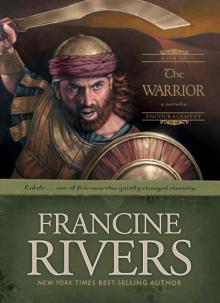- Home
- Francine Rivers
A Voice in the Wind Page 4
A Voice in the Wind Read online
Page 4
She opened her eyes and opened her hands again. “The Lord provides,” she said softly and ate slowly, savoring each kernel.
As the sun went down, Hadassah felt oddly at peace. Even with all the destruction and death around her, with all the suffering ahead, she felt God’s nearness. She looked up at the clear night sky. The stars were bright and a wind blew softly, reminding her of Galilee.
The night was warm . . . she had eaten . . . she would live. “God always leaves a remnant,” Mark had said. Of all the members of her family, her faith was weakest, her spirit the most doubting and the least bold. Of all of them, she was least worthy.
“Why me, Lord?” she asked, weeping softly. “Why me?”
Chapter 2
Atretes raised his hand high, signaling to his father that a Roman legion was moving into the clearing. Hidden by the forest, the German warriors waited. Each held a framea—a spear much dreaded by the Romans, for its strong shaft held a narrow, short head that was razor-sharp and could pierce armor. It could be hurled with accuracy from a great distance or used in hand-to-hand combat.
Seeing the moment was right, Atretes brought his hand down. His father immediately began the war cry. It rose and spread along the horizon as the entire retinue sang out against their shields to Tiwaz, their war god. Marcobus, leader of the Bructeri, unifier of all the Germanic tribes, joined in, along with the rest of the Bructeri and the Batavi tribes—a hundred men in all. The horrifying and chaotic sound reverberated across the valley below like a roar from the demons of Hades. Grinning, Atretes saw the legionnaires lose their rhythm. And it was in that instant that the tribesmen flooded down the hillsides for the attack.
Surprised and confused by the barbarous screams, the Romans could not hear their commanders ordering them to form the tortoise. The commanders knew that this military maneuver—in which the men moved close together and turned their shields outward on all sides and above their heads, thus forming an impenetrable armor similar to a tortoise’s shell—was their only true defense against the barbarians. However, seeing a horde of fierce, almost naked warriors armed with spears falling on their flanks, the legion broke ranks just long enough to give the tribesmen a badly needed advantage. Framea flew. Legionnaires dropped.
Atretes’ father, Hermun, headed the wedge formation, which began the charge. His chieftain’s helmet glistening, he led his clan from concealment in the thick spruce forest as the Chatti warriors ran down the hillside. Long hair streaming, most of the tribesmen wore nothing more than a sagum—a short protective cloak that was secured at the shoulder by a simple bronze brooch—and they were armed simply with an iron-and-leather shield and a framea. Only the wealthiest chieftains carried swords and wore helmets.
Screaming his war cry, Atretes threw his framea as he ran. The long-headed spear went through the throat of a Roman tribune and sent the ensign crashing to the ground. Another Roman grabbed it up, but Atretes reached him and broke his back with one blow of his doubled fists. Ripping the spear from the dead man, he thrust it through another soldier.
Tribeswomen and children ran down the hillside and sat, shrieking and cheering for their warriors. The battle would not last long, for the element of surprise was only a momentary advantage. As soon as the Romans came to grips with the situation, the German warriors would retreat. They knew they had little chance in a protracted battle against the highly trained forces of Rome. Over the last months, the tribesmen had used the tactic that worked best: nagging the flanks of the army, striking quickly, then retreating as soon as the battle began to turn.
Atretes’ spear snapped as he rammed it through the armor of a centurion. He swore to Tiwaz and slammed his shield into the head of an attacker as he snatched up a dead centurion’s gladius, or short sword, barely managing to parry the blows from two other Romans. He was unaccustomed to fighting with a short sword and knew he had to fall back before he was overcome.
The legion’s initial panic was already gone. Mounted officers were in the midst of the fracas, wielding their swords and shouting orders. The ranks were closing again, and the Romans’ training and discipline were taking their toll on their attackers.
Atretes saw his brother Varus fall. Swinging the sword, he amputated a Roman’s arm. When he tried to reach his brother another centurion came against him, and he was hard put to stay alive against the man’s skill with the gladius. Atretes blocked thrust after thrust. Using brute force, he rammed the full weight of his powerful body into the centurion and sent him back into three others.
“Your back, Atretes!” his father shouted. Atretes ducked sharply as he swung around, bringing the sword down and up swiftly, breaking bone as he sliced upward through the groin and into the abdomen of his attacker. The man screamed and went down before Atretes could pull the sword free.
The centurion Atretes had knocked down had regained his feet and was coming at him again. Swordless, Atretes rolled and caught his attacker’s leg, bringing him down. Jumping onto him, he gripped the man’s head and made a hard jerk, breaking his neck. Grabbing the gladius from lifeless fingers, he leaped to his feet and charged a Roman who was pulling his sword out of a fallen clansman. Atretes caught him across the exposed side of his neck and a fountain of blood splattered him in the face. Dropping the sword, he yanked a framea from the body of a dead soldier as he ran.
He couldn’t see his father’s gilded helmet, and German forces were dwindling as the Roman soldiers regrouped and showed the organized destruction for which they were famous. Marcobus, his left arm hanging useless at his side, shouted for his men to fall back. Contrary to Roman thinking, the tribes saw nothing dishonorable in giving ground when the battle turned. The Batavi followed suit and retreated, leaving Atretes’ clan behind and vulnerable. Atretes knew prudence called for the Chatti to fall back into the woods with the others, but his blood was hot, his hand still strong. He charged into two Romans, screaming his war cry.
His uncle fell, a Roman dart through his chest. His cousin Rolf tried to reach him and was cut down by a centurion. Roaring in fury, Atretes hacked right and left, caving in the side of one legionnaire’s helmet and slicing through the arm of another. Too many of his clansmen were falling, and finally prudence won. Atretes shouted for the remaining members of his clan to head for the woods. They melted into the forest, leaving the Romans frustrated and ill-equipped to pursue.
A half mile up the hill, Atretes found his sister Marta on her knees cleaning her husband’s shoulder wound. His brother was unconscious beside them, his leg wound tightly bound, the bleeding stanched.
Sweat pouring down his pale face, Usipi grimaced beneath Marta’s brisk, sure ministrations. “Your father,” he said. He raised his hand slightly, pointing.
Atretes ran through the woods to the west and came upon his mother, who held his father. One side of the chieftain’s helmet was caved in, the gilded bronze bloody. Atretes uttered a savage cry and went down on his knees.
Face white and contorted, his mother worked feverishly over a gaping wound across his father’s naked abdomen. She wept as she pushed his entrails back inside and tried to pull the wound closed. “Hermun,” she pleaded. “Hermun, Hermun . . .”
Atretes caught hold of his mother’s bloody wrists, stopping her frenzied efforts. “Leave him be.”
“No!”
“Mother!” His hands tightened as he jerked her once. “He is dead. You can do nothing more.”
She quieted, the stiff resistance relaxed. He let go of her and her bloody hands lay limply against her thighs. Atretes closed his father’s staring eyes and placed his hands on his motionless chest. His mother sat very still for a long moment, then, with a sob, leaned forward and drew her husband’s bloody head into her lap. Using the edge of his short cloak, she wiped his face as though he were a child.
“I will carry him to the others,” Atretes said. His mother raised Hermun’s shoulders and Atretes lifted him from the ground. Tears wet his hard face as he stumbled beneath the weight of his fa
ther’s body, dropping to one knee. Fighting exhaustion, he gritted his teeth and rose, each footstep an effort.
When they reached his sister and Usipi, he laid his father down carefully beside the bodies of Dulga and Rolf, whom the other women of his family had managed to retrieve. Breathing heavily and feeling weakness creeping up his spine, Atretes took the carved talisman his father wore around his neck and pressed the wooden image into his palm. It had been carved from the oak of the sacred grove and had protected Hermun through many battles. Atretes tried to gain strength from it, but he felt a deep despair.
The battle was lost, and his father was dead. Leadership would fall to him if he was strong enough to hold it. But did he want it?
The prophecies of Veleda, the Bructeri seeress who sat hidden in her tower where no man could see her, were proving false. Though Julius Civilis and his rebels had destroyed the frontier legions, the rebellion was now failing. After a year, freedom was no longer within their grasp.
Vespasian had come into power after a twelve-month period that saw three emperors fall. Now, under the command of the ruler’s youngest son, Domitian, eight more legions had been sent against Julius Civilis. Veleda had prophesied that Domitian’s youth would defeat him, but the boy had arrived on the frontier at the head of his legions, rather than hiding behind them. Reputedly trained as a gladiator, he seemed determined to prove himself as able a commander as his father, Vespasian, and his brother, Titus. And the young maggot was succeeding.
Overcoming the rebel forces, Domitian took them captive. He ordered Julius Civilis’ men decimated. Prisoners were lined up and one out of every ten men was crucified. With Julius Civilis chained and on his way to Rome, the unity of the tribes who had supported him was breaking down. Factions were splitting off. Many of the Batavi had been taken captive. One out of three men in Atretes’ own clan were now dead.
Atretes felt his anger growing as he looked at his father. Only a week ago, the Chatti leader had thrown pieces of branch and bark from one of the sacred oaks onto a white cloth. He had been unable to read a clear sign from them, but the priest had said the neighs and snorts of the white horse assured a victory.
Victory! Where was their victory? Had even their gods turned against them? Or were the Roman gods proving themselves more powerful than the mighty Tiwaz?
As they carried their dead to the village, other clansmen gathered, reporting that the Romans had marched north.
Atretes cut wood to build a death house for his father, while his mother dressed her husband in his finest furs and prepared the funeral feast. She placed the best of their pottery bowls, cups, and platters beside her husband and filled the bowls with thick grain porridge and the cups with strong mead. Roasted joints of lamb and pork were placed on the platter. When she finished, Atretes set fire to the death house. Other fires flared bright in the darkness.
“It is done,” his mother said, tears running down her cheeks. She laid a gentle hand on Atretes. “You will gather the men in the sacred grove tomorrow night.”
He knew his mother had assumed he would become chieftain. “It will be up to the priests.”
“They have already chosen you, as have our men. Who is better suited? Was it not your command they followed without question when the battle turned? And the Chatti were the last to leave the field.”
“Only because Father had fallen, not through any great valor of mine.”
“You will be chieftain, Atretes. Hermun knew this day would come. It is why he trained you as he did, driving you harder than his other sons. The signs told us at your birth that you would become a great leader.”
“The signs have been wrong before.”
“Not in this. Some matters are not of choice. You cannot fight destiny. Do you remember the night your father took you before the council and presented you with your shield and framea?”
“Yes,” he said, containing his grief as he stared into the flames, his father’s body visible as the walls crumbled. He made a fist. The last thing he wanted was the bondage of leadership.
“You became a man that night, Atretes. And you have grown in manhood ever since. You killed your first enemy at fourteen.” She smiled, her blue eyes glistening with tears. “You barely had any whiskers to shave over your dead foe, but you scraped your face raw to follow our tradition.”
Her hand tightened. “You were fifteen when you took Ania as your bride, sixteen when you lost her in childbirth, and your son as well. Two years later, you triumphed over Bructeri raiders and were allowed the honor of removing the iron ring from your finger. Your father said you fought better than any warrior he had ever seen. He was proud of you.” She gripped his arm. “I am proud of you!”
She fell silent, the tears streaming down her face as she looked into the flames again. “We had peace for two years.”
“And then Julius Civilis came to us and told us of the rebellion in Rome.”
“Yes,” she said, looking up at him again. “And a chance of freedom.”
“Vespasian has taken control, Mother.”
“Vespasian is a man. We have Tiwaz on our side. Have you not listened to Veleda’s prophecies? Freedom will not come to us as a gift, Atretes. We must fight for it.”
He raked his hand back through his blond hair and stared up at the stars. If only he had the knowledge of a priest and could read the answer there, in the heavens. He wanted to fight! He wanted it so badly that his muscles grew taut and hard and his heart beat faster. He felt most alive when he was in battle, fighting for victory and for his very life. As a chieftain, he would have other things of which to think, others to consider.
“When you were a boy, you dreamed of leaving the tribe and becoming part of Marcobus’ retinue,” his mother said quietly.
Atretes looked down at her in surprise. Did she know everything that was in his mind?
She touched his face tenderly. “You never spoke of it out of loyalty to your father, but he knew as well as I. Atretes, you have another destiny. I read the signs at your birth. You will lead your people to freedom.”
“Or death,” he said grimly.
“Many will die,” she said solemnly. “I among them.”
“Mother,” he said, but her hand tightened on his arm, silencing him.
“It will be so. I have seen it.” Her blue eyes became vague and disquieting. “Your name will become known in Rome. You will fight as no other man in the tribe of Chatti has done before you and you will triumph over every foe.” Her voice was strange and distant. “A storm is coming that will blow across the Empire and destroy it. It will come from the north and the east and west, and you will be a part of it. And there is a woman, a woman with dark hair and dark eyes, a woman of strange ways whom you will love.” She fell silent, blinking as though coming out of a deep sleep.
Atretes’ heart beat fast. He had seen his mother like this only a few times before, and each time there was a coldness in the pit of his stomach. Had she been anyone else, Atretes would have discounted her words as those of a mother dreaming of greatness for her son. But he could not, for his mother was a respected seer and diviner, revered by some as a goddess.
Her expression cleared. She let out her breath and smiled bleakly. “You must rest, Atretes,” she said. “You must be ready for what is ahead.” She looked away into the glowing embers of the death house. “The fire is almost out. Leave me alone with Hermun,” she said softly, her face like gold in the flickering light.
It was hours before Atretes could sleep. When he arose from his pallet at dawn and came out of the longhouse, he saw his mother collecting his father’s bones from the ashes and placing them in an earthen vessel for burial.
Four more men died of battle wounds before the sun reached its zenith, and new death houses were being built.
Then word was brought to Atretes that a deserter had been caught. Atretes knew the men were looking to him to lead the council. He knew what had to be done, but bringing judgment on a man, even one such as Wagast, sat ill
with him.
The men gathered in the oak grove, the high council sitting near the sacred tree. The night air was cool and moist; the sounds of frogs and owls echoed eerily around the gathered men. Atretes took a humble position, half in hopes that leadership would fall to Rud or Holt rather than him. They were able men, older.
Gundrid, the priest, took the images from the hollow trunk of the sacred oak and placed them on the lower branches. Murmuring incantations and prayers, he unwrapped and held high the golden horns, which were adorned with graven symbols.
When he lowered this holy element, Atretes remained motionless. The priest’s pale blue eyes moved slowly from one man to the next and came to rest on him. Atretes’ heart began to pound. The priest came toward him and he felt the sweat breaking out on his skin. Only the priests and the chieftain were allowed to touch the sacred images and great horns. When the priest held them out to him, Atretes saw that on one horn were the images of a three-headed man holding an ax, and a snake nursing her young. On the other was a horned man holding a sickle and leading a goat. Atretes knew if he touched the sacred horns he would be declaring himself the new high chieftain. The men were already cheering and raising their spears in confirmation.
Steadying his nerves, he placed his framea on the ground beside him and held out his hands, thankful that they were steady. As the priest relinquished the holy idol into his keeping, Atretes rose, holding the great horns high. The men cheered louder and shook their spears in acclamation. Atretes cried out to Tiwaz, his deep voice carrying through the woods.
The priest lit the incense lanterns as Atretes carried the horns to the altar. When he placed the horns there, he knelt for the high priest’s blessing. Gundrid called upon Tiwaz to guide the clan’s new high chieftain, to give him wisdom and to give his fighting arm strength. Atretes felt his face and body go hot when the priest prayed that a wife would be found for him and that their union would be fruitful.

 An Echo in the Darkness
An Echo in the Darkness A Lineage of Grace
A Lineage of Grace The Prince: Jonathan
The Prince: Jonathan Bridge to Haven
Bridge to Haven The Priest: Aaron
The Priest: Aaron Her Mother's Hope
Her Mother's Hope Redeeming Love
Redeeming Love The Scarlet Thread
The Scarlet Thread The Masterpiece
The Masterpiece The Last Sin Eater
The Last Sin Eater The Prophet: Amos
The Prophet: Amos As Sure as the Dawn
As Sure as the Dawn Her Daughter's Dream
Her Daughter's Dream A Voice in the Wind
A Voice in the Wind The Warrior: Caleb
The Warrior: Caleb The Scribe: Silas
The Scribe: Silas And the Shofar Blew
And the Shofar Blew The Atonement Child
The Atonement Child Unshaken_Ruth
Unshaken_Ruth Unspoken_Bathsheba
Unspoken_Bathsheba The Scribe
The Scribe Sons of Encouragement
Sons of Encouragement The Shoe Box
The Shoe Box Sycamore Hill
Sycamore Hill Unafraid_Mary
Unafraid_Mary Marta's Legacy Collection
Marta's Legacy Collection